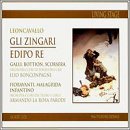| All Artists: Leoncavallo, Torino Rai Orch, La Rosa Parodi Title: Gli Zingari / Edipo Re Members Wishing: 0 Total Copies: 0 Label: Living Stage Release Date: 11/23/1999 Genre: Classical Styles: Opera & Classical Vocal, Historical Periods, Modern, 20th, & 21st Century Number of Discs: 2 SwapaCD Credits: 2 UPC: 675754074722 |
Search - Leoncavallo, Torino Rai Orch, La Rosa Parodi :: Gli Zingari / Edipo Re
 | Leoncavallo, Torino Rai Orch, La Rosa Parodi Gli Zingari / Edipo Re Genre: Classical
|
Larger Image |
CD Details |
CD ReviewsNeglected Masterpiece John C. Mucci | Wilton, CT USA | 02/06/2002 (4 out of 5 stars) "For those listeners who believe that Leoncavallo only wrote PAGLIACCI, there are many wonderful surprises in store. Such operas as ZAZA, LA BOHEME (otherwise known as "the other" La Boheme), and EDIPO RE are on disc, with many others to come, including MAIA, I Medici, Chatterton, and Der Roland von Berlin, which were, at one time, extremely popular in Italy and Germany. This disc represents I ZINGARI and his last opera, EDIPO RE (OEDIPUS REX of course), which he did not live to finish.
I am not an authority on opera before 1800, but I don't think there were many written with Oedipus as a subject. I am sure there were, as classical subjects seem to have been pillaged from the outset, and Sophocles' story is an outstanding one. But Oedipus was suddenly taken up in the 20th century by Stravinsky/Cocteau in 1936, and in the same year by Enesco, and then by Carl Orff in 1959. These three adaptations (mainly taken from Sophocles in a translation, in their native languages) made fullest use of the Freudian take on the subject. Stylistically the Stravinsky and Orff are in those composers' neo-classical style, and as such are interesting experiments in a staid, cold manner overlaid with a modern allowance for freer tonality and modulation. The Enesco uses microtonality, and as such is more modern without the classicism, and is a work that pushes the edge of the envelope enough to insure its not being performed again for a long time. It is the unlikely composer Ruggero Leoncavallo whose last work, Edipo Re, was left unfinished in 1919, and which deserves a closer inspection. At present, a performing version of about 35 minutes attests to the powerful nature of the music, but what impresses me is that Edipo Re (with libretto by Forzano, of GIANNI SCHICCHI fame) takes the plunge of plotting out the story in terms of a 19th century Italian Opera. The 'arms-length' manner of the neo-classicists with all their choruses and messengers and offstage action, and really puts the audience in the thick of it (one might say in a more verismo fashion). For example, I do not know of any Oedipus adaptation which actually has any kind of love scene between Oedipus and his mother/wife Jocasta. We never really see the two of them interact in a meaningful way. In Leoncavallo's Edipo, there is an actual duet between the two, rather in the manner of his Pagliacci love duet between Nedda and Silvio! It is a stunning moment, and a duet which is on the one hand unlikely, and on the other outrageously new--no one has tried to do it since. Think of it: Oedipus and his mother singing something as intimate as a duet? The opera is very dark and very serious. It makes Edipo's fall all the more poignant and horrifying. When the messenger brings in the shepherd who explains who Edipo really is, the full weight of what's happened is driven home with what seems to be rather nihilistic and almost Futuristic effect. Tiresias's baritone voice sounds as though it were amplified through a megaphone, cataloguing in excruciating detail how Edipo "uccidere il suo padre e la madre ha sposato" like hammer blows. At the very end, when Oedipus understands the horror of his fate, he sings a perfectly gorgeous, italianate aria that might be found in a Giordano or Puccini opera, ending with his commitment to blind himself. Truth to tell, the 40 minutes or so of extant music is so good and of such a tight character that it would make a good double-bill for Salome (or Cavalleria for that matter, instead of Pagliacci!, or Mese Mariano or Giordano). Except for that possible megaphone effect, (which may or may not be what I'm hearing), the choruses, instead of being the rhythmic and percussive ideals of Stravinsky or Orff, are melodic and sensual. It is the warm, well-modulated Italian Opera idea of Chorus, a la Nabucco, not the distantly objective Khoros of Sophocles. Of all the versions of this story I have heard, this one is the most moving. Leoncavallo was a defintive verismo composer whose work is nearly obscured. His Pagliacci is still quite good (although that bell chorus drives me batty and they hardly ever restore the cuts), but there is his Zaza, his Boheme, and Edipo Re, this last masterpiece which if you get a chance to hear, I whole heartedly suggest it." |

 Track Listings (18) - Disc #1
Track Listings (18) - Disc #1